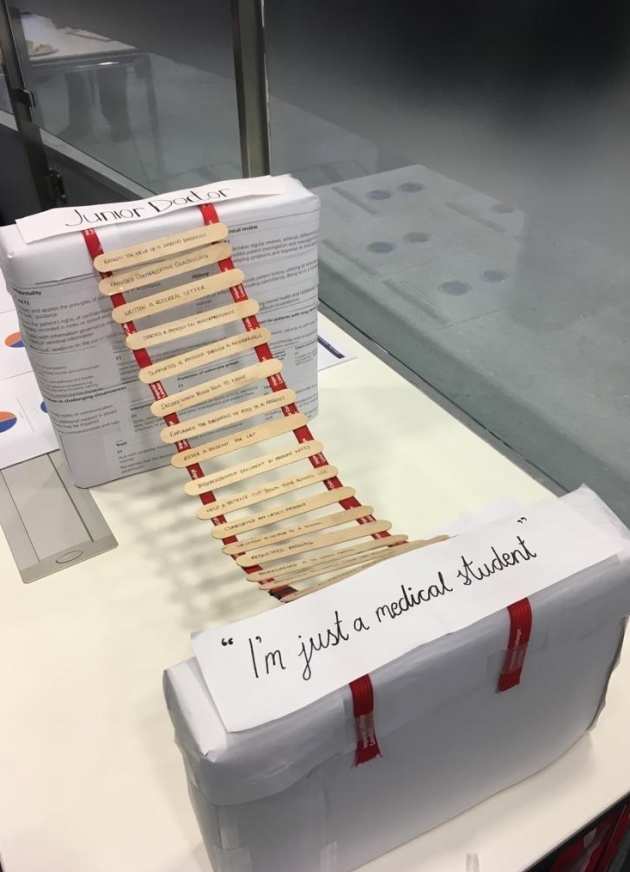The transition from medical student to newly qualified doctor can be a challenging experience. Well trained, prepared, compassionate and competent newly qualified doctors are essential for the safe and effective running of our health system. However, medical students often report they feel underprepared for entering the world of clinical practice, with particular emphasis on clinical reasoning, emergency management, multidisciplinary team working and understanding of ethical issues. (Monrouxe et al., 2017).
However, the literature in this area remains limited, with scales and ratings often used to measure students preparedness as they enter the clinical workplace. There is an urgent need to reconsider how curriculum, assessments, mentorship, supervision and the medical school learning environment can better support students for their transition to becoming a doctor.
Longitudinal learning is one educational approach to address this challenge, involving students spending a longer time immersed within a clinical team, where they form meaningful relationships with patients, staff and their peers. Students take an active role with their patients, often advocating for them and guiding them through their healthcare journey. Clinical learning occurs in an authentic manner, synergistically with patient care, with continuity with patients, curriculum and supervision as a core guiding principles (Hirsh et al, 2007).
Innovation and research
MEdIC has led the way nationally in the implementation and innovation of longitudinal integrated clerkships (LICs), a model of curriculum design using longitudinal learning.
Following the experience and expertise gained from running a number of successful longitudinal pilots, MEdIC will be launching LIA in 2021 which will be rolled out to all medical students at Imperial in their 5th year of study. Students on these courses act as ‘paraprofessionals’ advocating for their patients and contributing to their care, supporting their transition from student to doctor.
MEdIC more broadly is interested in exploring innovation and research related to students preparedness for practice from a variety of perspectives, using a mixture of research methodologies. Qualitatively, MEdIC has explored students’ perceptions around preparedness for practice through a virtual on call simulation. We explored the cognitive and emotional challenges students experience as they take on the roles and responsibility of a qualified doctor in a simulated environment. Quantitatively, we have investigated whether longitudinal models of learning can affect professional student attributes, which have been shown to impact future clinical practice.
We are also interested in understanding the theoretical underpinning of preparedness for practice and have explored areas including authenticity, communities of practice, transformational learning and student belonging. With the rapid transformation of the medical curriculum from the COVID-19 pandemic, MEdIC is exploring how service learning may be incorporated within clinical placements to support the healthcare system and promote authentic experience for our students as they prepare to become doctors.
MEdIC founded UKLIC (UK think tank of LICs) bringing together UK institutions interested in developing longitudinal learning, to share experiences and learn from each other.
If you’re interested in discussing a project or collaboration on this theme please contact Dr Ravi Parekh r.parekh@imperial.ac.uk
Accordion
- Exploring preparedness for practice of final year medical students using an innovative simulation design
- Exploring whether there is a change in professional attributes through a longitudinal learning curriculum
- Exploring the change in identity of LIC students using a novel “stepping stone” methodology
‘It was the worst possible timing’: the response of UK Longitudinal Integrated Clerkships to Covid-19 Brown, M.E.L., Parekh, R., Anderson, K., Mayat, N., McKeown, A. Education for Primary Care, Jun 22, doi: 10.1080/14739879.2022.2079428
Can stoic training develop medical student empathy and resilience? A mixed-methods study Brown, M.E.L., MacLellan, A., Laughey, W., Omer, U., Himmi, G., LeBon T. & Finn, G.M BMC Med Education Apr 2022, doi:10.1186/s12909-022-03391-x
Using vlogging to facilitate medical student reflection Gajria C, Gunning E, Horsburgh J, Kumar, S. Education for Primary Care 2022 May; 1-4 doi: 10.1080/14739879.2022.2070868
Community-engaged medical education: helping to address child health and social inequality
Parekh, R., Maini, A., Golding, B., Kumar, S.
BMJ 2021 Sep. doi: 10.1136/archdischild-2021-322024
Exploring why medical students still feel underprepared for clinical practice: a qualitative analysis of an authentic on-call simulation
Hawkins, N., Younan, H.C., Parekh, R., Fyfe, M.V., & McKeown, A.
BMC Medical Education 2021 Mar; 21:165. doi.org/10.1186/s12909-021-02605-y. Epub 2021 Mar 17.
Medical students as service learners: opportunities, risks and recommendations
Lalloo, F., Hawkins, N., Lindley, R., & Kumar, S.
Education for Primary Care 2021 Feb;31(6):1-5. doi: 10.1080/14739879.2020.1869589. Epub 2021 Feb 14.
Learning through service: a qualitative study of a community-based placement in general practice
Tanna, S, Fyfe, M., Kumar, S.
Education for Primary Care 2020 May 14:1-6 doi: 10.1080/14739879.2020.1759459
Can stoic training develop medical student empathy and resilience? A mixed-methods study Brown, MEL., MacLellan, A., Laughey, Wi., Omar, U., Himmi, G., LeBon, T., Finn,G. ASME 2022
Can Longitudinal Integrated Clerkships help protect against a decline in professional attributes in medical students? Evidence from a longitudinal cohort study
Parekh, R., McKeown, A., Ruzangi, J., Simpkin, A., Tudor-Williams, G., Kumar, S.
Association for Medical Education in Europe conference (AMEE) 2019
Tackling a perceived misalignment between curriculum and assessment in a pilot LIC
Parekh, R., McKeown, A. (2019)
Consortium of Longitudinal Integrated Clerkships Conference (CLIC) 2019
“A bit of a doctor factory” What are medical students’ experiences of belonging in Longitudinal Integrated Clerkships?
Parekh, R. (2019)
Consortium of Longitudinal Integrated Clerkships Conference (CLIC) 2019
The Trojan Horse: Medical students as the hidden army for the UK health service?
McKeown, A., Parekh, R., Kumar, S.
Global Community Engaged Medical Education Muster Conference 2018
An Integrated Clinical Apprenticeship: Evaluation of a novel Longitudinal Integrated Clerkship at Imperial College
McKeown, A., Parekh, R., Kumar, S.
The Association for the Study of Medical Education (ASME)2018
From Chrysalis to Butterfly: Using longitudinal learning to support the transformation from student to apprentice
Kumar, S., McKeown, A., Parekh, R., Tanna, S.
Royal Society of Medicine (RSM), Medical Innovations Summit 2017
